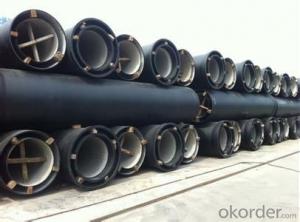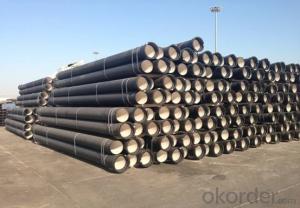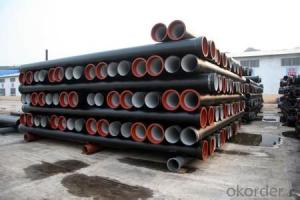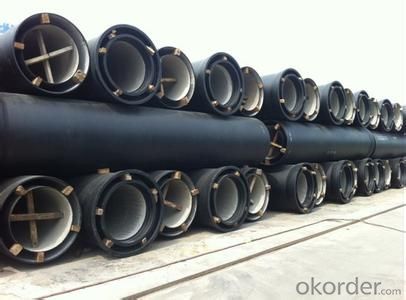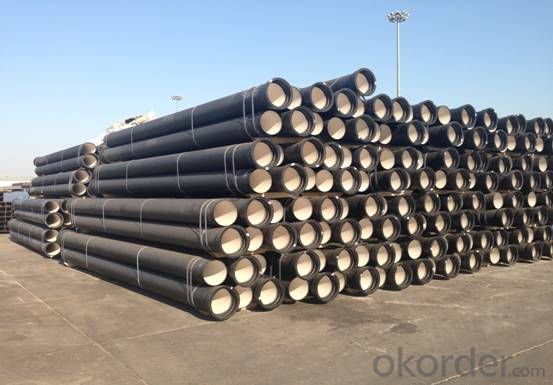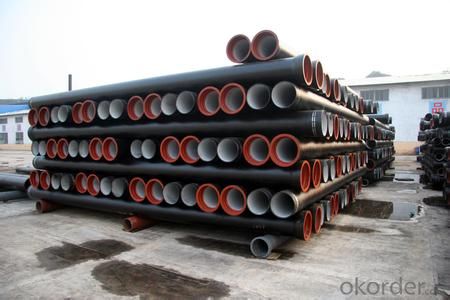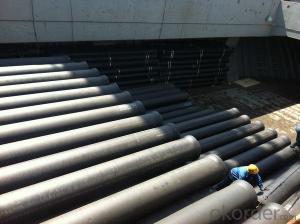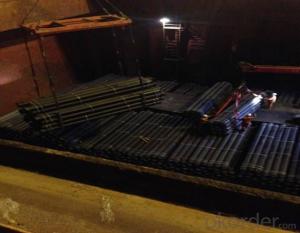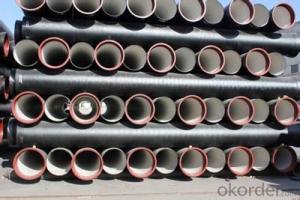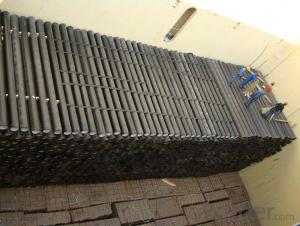DUCTILE IRON PIPE K8 DN700
- Loading Port:
- China Main Port
- Payment Terms:
- TT OR LC
- Min Order Qty:
- -
- Supply Capability:
- -
OKorder Service Pledge
OKorder Financial Service
You Might Also Like
Ductile Iron Cast Pipe is without any defects compare with tradition casting tech, which has many advantages particularly as follow:
(1) High density. In the "vertical upward casting" process, the melt iron of centre liquid column in center crystallizer is continuously feeding for volume shrinkage caused by condensation tube at outer circumference , which lead to be free of shrinkage porosity.
(2) High purity. When melt iron pouring, the mixed impurities such as gas, dross, sand grain which are lighter than melt iron could be eliminated at furnace mouth, its impossible to enter into the crystallizer through the channel, so the melt iron into the crystallizer is very pure.
(3) Strength with toughness. The cooling speed provided by continuous crystallizer is 30 times than sand casting and 5 times than centrifugal casting, and doesn't produce white iron, the eutectic cell volume of continuous cast iron is one eighth to one tenth compare with traditional cast iron. The density of graphite nodule in ductile iron can reach 300-700 pcs/mm2. Therefore, all reason above improve the strength and toughness of continuous cast iron.
(4) Free machining. The high speed cooling make the hardening phase (such as boride, steadite) not appear like reticular, massive or thick, but diffuse like fish bone and pane in shape, moreover, there are tiny graphite flakes inlaid hardening phase. It's free machining in BrinellHardness the range of 250-300HB. However, the Brinell Hardness of 250 is top limit to common metal materials.
(5) Uniform composition of tube wall. The convection mixing of liquid column caused by marching type drawing in crystallizer make the composition of tube wall well-distributed, and concentration gradient very little.
(6) High productivity. To the wall thickness of tube under 10mm, the speed of continuous casting is 1 meter/min, to the wall thickness of tube under 20mm, the speed of continuous casting is 0.5 meter/min, which is high efficiency that centrifugal or other casting tech couldn't reach.
- Q: Can ductile iron pipes be used for underground steam distribution systems?
- Yes, ductile iron pipes can be used for underground steam distribution systems. Ductile iron is a type of cast iron that has been treated with magnesium to make it more flexible and resistant to cracking. This makes it suitable for use in underground applications where the pipes may need to withstand high pressure and temperature conditions, such as in steam distribution systems. Ductile iron pipes have excellent strength and durability, which makes them capable of handling the extreme conditions associated with steam distribution. Additionally, their corrosion resistance properties make them a reliable choice for long-term use in underground environments. However, it is important to note that proper insulation should be used to prevent heat loss and ensure the efficiency of the steam distribution system.
- Q: How does ductile iron pipe perform in extreme temperatures?
- Ductile iron pipe is renowned for its exceptional performance in extreme temperatures, thanks to its unique composition and manufacturing process. Its structural integrity remains uncompromised, allowing it to endure both high and low temperatures without issue. When it comes to high temperatures, ductile iron pipe showcases remarkable heat resistance. It can withstand temperatures of up to 1000 degrees Fahrenheit, making it perfect for applications involving hot liquids or gases, such as steam pipelines or industrial processes. Its strength and thermal stability enable it to maintain its shape and structural integrity even under extreme heat conditions, guaranteeing long-term reliability and safety. Similarly, ductile iron pipe excels in low-temperature environments. It can brave sub-zero temperatures without becoming brittle or prone to cracking, a common problem with materials like cast iron. This makes ductile iron pipe an ideal choice for applications in cold climates, such as water distribution systems in freezing temperatures. Moreover, the ability of ductile iron pipe to resist thermal expansion and contraction is another advantage in extreme temperatures. It has a low coefficient of thermal expansion, meaning it expands and contracts less compared to other materials. This property minimizes stress on the pipe, reducing the risk of leaks or failures caused by temperature fluctuations. In conclusion, ductile iron pipe demonstrates outstanding performance in extreme temperatures. Its heat resistance, ability to withstand low temperatures, and resistance to thermal expansion and contraction make it a reliable option for various applications, ensuring safe and efficient operations even in challenging environments.
- Q: How are ductile iron pipes tested for quality?
- Ductile iron pipes are tested for quality through various methods, including hydrostatic pressure testing, dimensional inspection, and mechanical properties testing. Hydrostatic pressure testing involves subjecting the pipes to water pressure to ensure they can withstand the intended operating conditions without any leakage or failure. Dimensional inspection assesses the pipes' dimensions, such as diameter, wall thickness, and length, to ensure they meet the specified standards. Mechanical properties testing evaluates the pipes' tensile strength, yield strength, and elongation to ensure they possess the necessary strength and flexibility. Overall, these rigorous testing procedures help ensure the high quality and reliability of ductile iron pipes.
- Q: Can ductile iron pipe be used in areas with high groundwater levels?
- Yes, ductile iron pipe can be used in areas with high groundwater levels. Ductile iron is known for its durability and corrosion resistance, making it suitable for underground applications including areas with high groundwater levels.
- Q: Are ductile iron pipes more expensive than other pipe materials?
- The cost of ductile iron pipes may be higher than some other pipe materials, depending on various factors. Ductile iron pipes are renowned for their durability, strength, and resistance to corrosion, making them a wise long-term investment. However, compared to materials such as PVC or HDPE, the initial cost of ductile iron pipes can be higher. Furthermore, the installation process of ductile iron pipes may necessitate more labor and specialized equipment, thereby increasing the overall expense. Nevertheless, it is crucial to consider specific project requirements, including the environment, expected lifespan, and required pressure ratings, in order to accurately assess the cost-effectiveness of ductile iron pipes in relation to other pipe materials.
- Q: How is ductile iron pipe protected against external corrosion?
- Ductile iron pipe is protected against external corrosion through a process called external coating. This involves applying a layer of protective coating, such as asphaltic or epoxy, on the outside surface of the pipe. The coating acts as a barrier, preventing moisture and corrosive substances from coming into contact with the iron, thus reducing the risk of corrosion. Additionally, cathodic protection methods, such as applying sacrificial anodes or using impressed current systems, may be employed to further enhance the corrosion resistance of the ductile iron pipe.
- Q: Ductile iron pipe connection mode
- Jack painted on the outer surface and rubber lubricant: lubricant evenly installed ring inner surface, outer surface coating in the socket to socket socket parts lubricant line all the brush in the socket.
- Q: Can ductile iron pipes be used for gas distribution systems?
- Certainly, gas distribution systems can utilize ductile iron pipes. The utilization of ductile iron pipes in various infrastructure applications, such as gas distribution systems, is widespread due to their exceptional qualities, including strength, durability, and resistance to corrosion. These pipes are engineered to withstand the high-pressure flow of gas and are suitable for installations both above and below ground. Furthermore, ductile iron pipes exhibit remarkable resistance to external loads, minimizing the risk of damage or fracture, thereby establishing them as a dependable and secure choice for gas distribution systems. Nevertheless, it is crucial to ensure that the pipes receive proper coating and protection against any potential corrosive elements present in the gas or soil to guarantee their longevity and optimal performance.
- Q: Is there any cast iron pipe used in the fire hose?
- No, I think so. In theory, you can.See if the specifications have any requirements for the material.
- Q: How is ductile iron pipe different from other types of pipes?
- Ductile iron pipe is different from other types of pipes in several ways. Firstly, ductile iron pipe is known for its exceptional strength and durability. It is made from a unique composition of iron, carbon, and other alloying elements, which gives it superior mechanical properties compared to other types of pipes. This makes ductile iron pipe highly resistant to external forces and pressure, making it ideal for underground installations, water mains, and sewer systems. Secondly, ductile iron pipe has excellent corrosion resistance. It is typically lined with a cement mortar or an internal coating, which provides a protective barrier against corrosion and extends the pipe's lifespan. This makes ductile iron pipe highly suitable for carrying water and other fluids, as it prevents contamination and maintains the quality of the transported material. Furthermore, ductile iron pipe offers a high degree of flexibility. Unlike more rigid pipe materials like cast iron, ductile iron pipe has the ability to withstand moderate deflection and ground movement without breaking or cracking. This flexibility makes it less prone to failure and reduces the need for costly repairs or replacements. Lastly, ductile iron pipe is relatively easy to install and maintain. It is typically available in long lengths, which minimizes the number of joints required. Additionally, the pipe's mechanical properties and corrosion resistance make it less susceptible to damage during installation or operation, resulting in lower maintenance costs over time. In conclusion, ductile iron pipe stands out from other types of pipes due to its exceptional strength, corrosion resistance, flexibility, and ease of installation. These qualities make it a reliable and cost-effective choice for various applications, especially in the water and wastewater industry.
Send your message to us
DUCTILE IRON PIPE K8 DN700
- Loading Port:
- China Main Port
- Payment Terms:
- TT OR LC
- Min Order Qty:
- -
- Supply Capability:
- -
OKorder Service Pledge
OKorder Financial Service
Similar products
Hot products
Hot Searches
Related keywords
